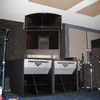Capt. Scott wrote:I repaired a Marshall IBS 200 watt Bass Head system, as it had a few pots broken off. (So I got the pots, pulled them and replaced them.)
When I did it, I used silver. I just figured that it was more conducive to the repair.
My "tech" says that I should have used LEAD as it has a lower melting point, but weaker bond.
SILVER is evidently used when you need strength.
Long story short, I am as confused as I was to begin.
SOMEONE really know? Anyone?
The three best conductors are gold,silver and copper...they all have a valence of 8 which means that in a copper,silver or gold atom there are 8 electrons in their outer shell or outer orbit, with 8 as the max you can have they are easily knocked out of orbit, as one of these gets knocked out it in turn knocks out the electron in the atom near it, this chain reaction of knocked out electrons is how electricity moves...
Something like silicon, tin or germanium have a valence of 4 which means that they can also knock out their outer electron however its more difficult since there are only 4 and they have a stronger bond -these are conductors but not really good conductors and are known as "semi-conductors...
Items such as rubber have atoms with a valence of only 1, to knock that singe electron out of orbit is extremely difficult, this is why items like rubber are classified as "insulators"

